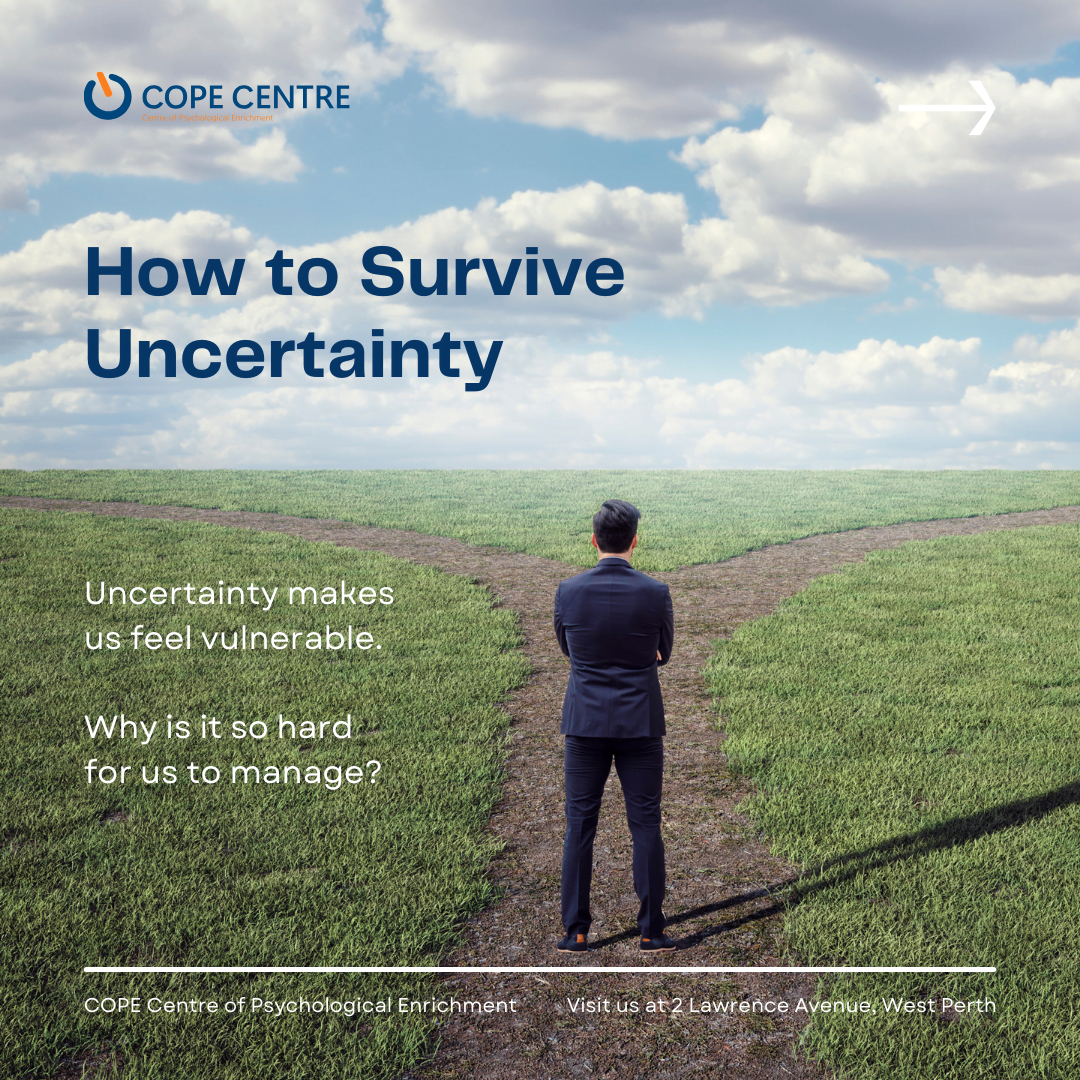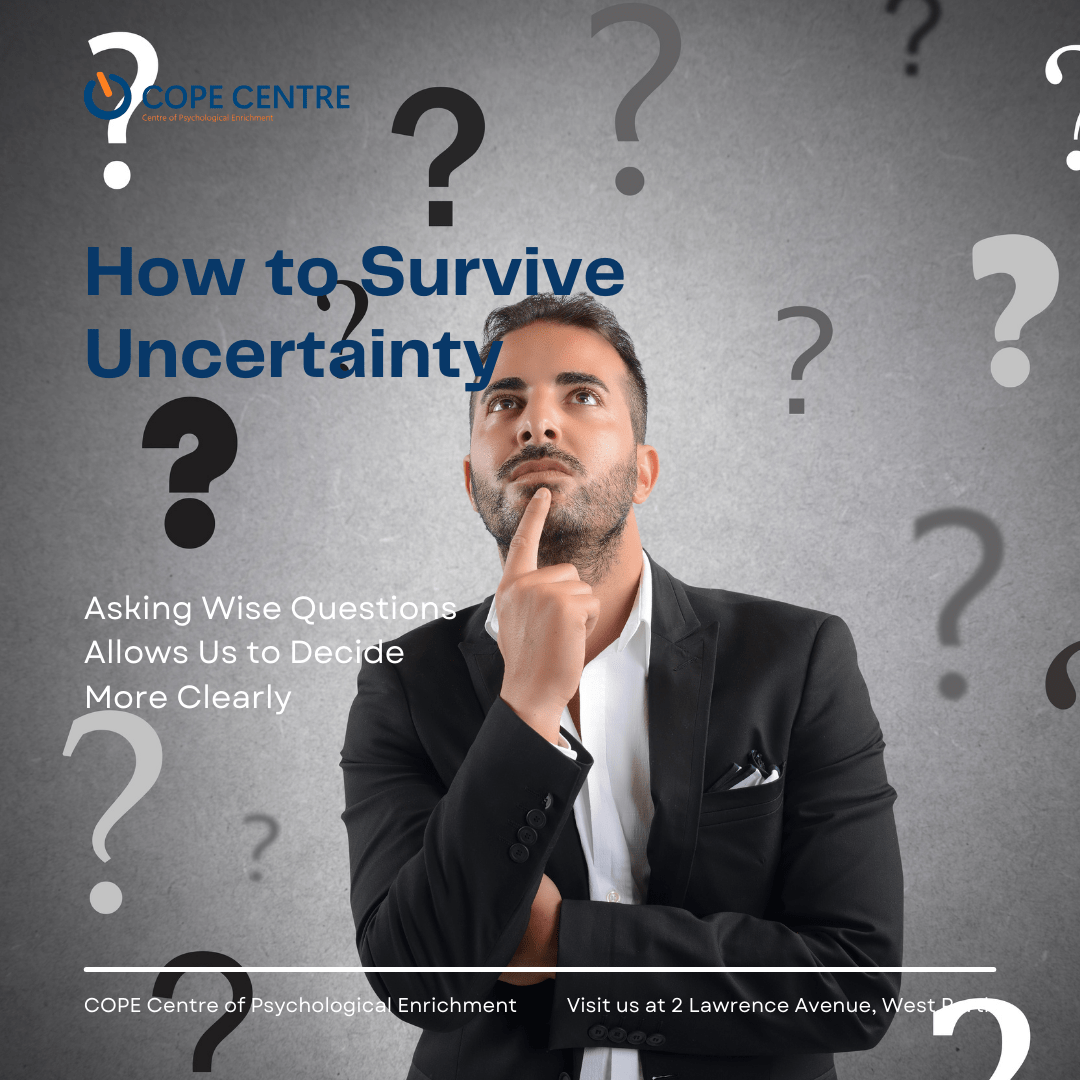Uncertainty makes us feel vulnerable. Why is it so hard for us to manage?
Why is it so hard for us to manage?
Could it be that, despite making us uncomfortable, it offers some benefit?
At many points in our lives, we find ourselves at a crossroads: “Am I making the best decision?”, “Should I let this opportunity go?”
Humans feel very uncomfortable with uncertainty, and there are good reasons for that.
For the sake of our survival, we need answers, to figure out where to find food, how to raise our children, etc.
And this drive to answer a question makes humans rush to find solutions.
So, uncertainty basically has a bad reputation. The idea that we must rush to an answer is very common, especially today.
Uncertainty is associated with the need for certainty; it appears when we have too many or too few options, we have to choose, and the freedom of choice overwhelms us.
When a person cannot tolerate uncertainty, it is generally because they overestimate the likelihood of something bad happening, they tend to exaggerate the risk and the negative consequences that could arise from that situation.

Can Uncertainty Be Positive?
When something goes wrong, we encounter something new, or when there is a problem we don’t know, uncertainty challenges us, it provokes us to think about something we need to reflect on at that moment. So, uncertainty is the springboard to greater thinking. People who are more tolerant or more capable of seeing uncertainty as a challenge are more flexible, less rigid, and more curious, they are able to see nuances and are not black-and-white thinkers.
“The intelligence of individuals is measured by the amount of uncertainty they can handle.” – Kant
Faced with Uncertainty, We Can:
1. Fight against it: What you resist, persists. This generates mental and physical exhaustion.
2. Live subject to the reality of what happens: Resignation makes us victims of circumstances or people.
3. Accept it: This is the healthiest way to live with uncertainty. This means RECOGNIZING what we are feeling (fear, anger, anguish, anxiety, frustration, etc.), acknowledging that answers do not exist now, or that we may need help. ACCEPTANCE allows us to live without stressing about the doubt of not knowing, it helps us WAIT. It is important to accept that living comes with an inevitable share of uncertainty.
Keeping Goals and Planning to Achieve Them is Necessary to Obtain What We Want.
However, we cannot respond to everything given the circumstances and what others will do.
When a situation appears as an obstacle in our path, clinging to the original plan creates tension because we want to achieve it no matter what. However, the new circumstance might be asking for a change of direction, another response, or to know how to wait.
Asking Wise Questions Allows Us to Decide More Clearly
“Why am I living this?”, “What is this situation teaching me?”, “What can I learn from it?”, “What would be the smartest thing I can do here?”, “Why am I going to intervene?”, “What is my intention?”
It is Essential to Know Ourselves:
Knowing what shapes our desires; otherwise, we fall into a LACK OF PERSONAL SOVEREIGNTY, which prevents us from responding wisely to life’s unforeseen events. Any management is valid, as long as it does not paralyze us.
Asking Wise Questions Allows Us to Decide More Clearly“Why am I living this?”, “What is this situation teaching me?”, “What can I learn from it?”, “What would be the smartest thing I can do here?”, “Why am I going to intervene?”,“What is my intention?”

Learning to Tolerate Uncertainty
To improve our levels of tolerance to uncertainty, we present some tips that can help you:
– Make a list of your behaviours. Learn to identify the moments when you feel anxious and the attitudes and behaviours you have when this happens. Making this list will make it easier for you to recognize these behaviours to modify them.
– Keep a journal where you describe the situations that caused you uncertainty, what you did, and what you did not do. This will allow you to express those hidden feelings and thoughts that may be harming you.
– Learn to face uncertainty: Avoidance behaviours only temporarily relieve discomfort and anxiety. We must expose ourselves to situations of uncertainty, not avoid them. This is the most effective way to learn to tolerate it because facing it reduces the level of anxiety it generates. Start with simpler situations and increase the level as your confidence grows.
– Stop seeking certainty: What things are under my control and what are not? The main idea we should focus on is that it is impossible to maintain control over everything that happens around us, so we must assume that absolute certainty and control do not exist.
“One recognizes intelligent people by their answers, and wise ones by their questions.” – Naguib Mahfouz
Article written by Mayra Brufau for COPE Centre
Our services Clinical Psychology – Cope Centre
Follow us here Facebook